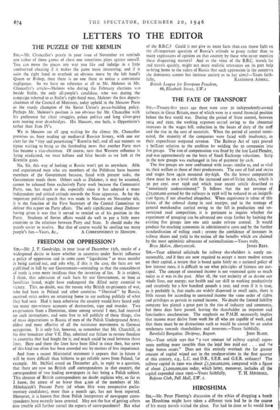SIR,—Your editorial solicitude for railway shareholders is surely un- reasonable,
and if they are now required to accept a more modest return on their capital, a return that is based quite fairly on a national policy of low interest rates, it is difficult to see what principles of fairness are out- raged. The concept of unearned income is not venerated quite so much today as it was in the past. After all, the vast majority of us devote our whole lives, our energy, our health and our skill to working productively and creatively for a few hundred pounds a year, and even if it is true, as it probably is, that stocks are widely dispersed in small units, there is little reason for according to unearned income the same order of rights and privileges as pertain to earned income. No doubt the limited liability company has played a great part in the rise of industry and commerce, but those days have passed, leaving the shareholder an impotent and functionless anachronism. The emphasis on P.M.H. necessarily implies that income must derive from work for all who are capable of work, and that there must be no distractions such as would be caused by an undue tenderness towards shareholders and investors.—Yours faithfully,
Barn field Bungalow, Shripney, Bognor. JOHN BLAKE.
SIR,—Your article says that " a vast amount (of railway capital) repre- sents nothing more tangible than the legal fees paid out . . . and the huge bonus issues." Does not this entirely overlook the far greater amount of capital wiped out in the amalgamations in the first quarter of this century, e.g., L.C. and D.R., S.E.R. and G.E.R. ordinary? The railway capital in 19oo was about £1,300,000,000, compared with a figure of about Li,000,000,000 today, which latter, moreover, includes all the capital expended since I9oo.—Yours faithfully, T. H. MINSHALL. Reform Club, Pall Mall, S.W. z.


































 Previous page
Previous page